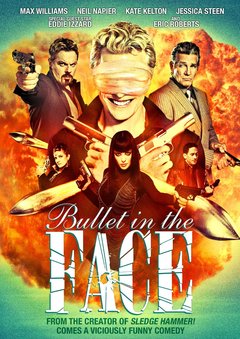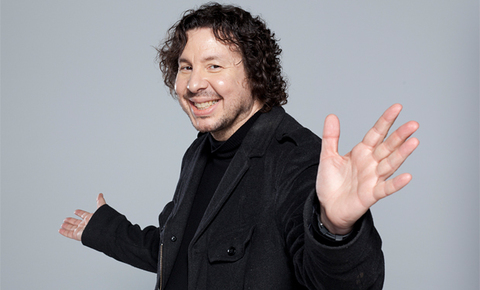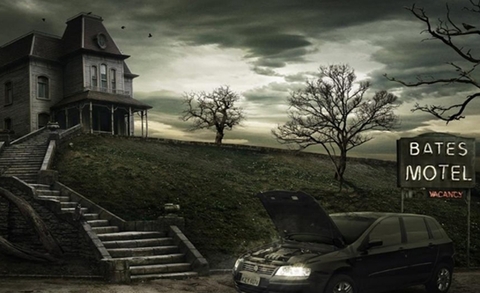The Light from the TV Shows: A Chat with Alan Spencer (‘Bullet in the Face’)
I’ve said before – if not in this column, then certainly elsewhere on the ‘net – how a great deal of my long-term tastes were established during my teen years in the ’80s, and one of the shows that was must-see TV for 16-year-old me was the ABC sitcom Sledge Hammer!, created by Alan Spencer. As a result, my eyebrows shot skyward when I first learned about the IFC series Bullet in the Face, since the press release prominently featured Spencer’s previous credits. Too bad the network’s programming and promotional departments weren’t quite as enthused as I was: the show’s six-episode season was noticed by precious few, resulting in a quick departure from the airwaves.

Thank goodness for Shout Factory, then, a company who knows a future cult classic when they see one: they released Bullet in the Face on DVD a few weeks back – sorry, I was at the TCA tour at the time, or I would’ve been able to promote it more heavily right as it hit the shelves – and were kind enough to set me up with an interview with the aforementioned Mr. Spencer.
After discussing his most recent endeavor in considerable detail, you will be unsurprised to learn that I took a bit of time to geek out as well, enjoying the opportunity to learn more about his friendships with Marty Feldman, Andy Kaufman, and Anthony Perkins, and to find out if we’re likely to ever see Sledge Hammer! return.
Bullz-Eye: How did Bullet in the Face originally come about? It seems to owe at least a spiritual debt to Sledge Hammer!, but from what I can tell, it appears that the project existed in some form – if only as a vague concept – before you ever came aboard.
Alan Spencer: Well, first of all, there’s nothing spiritual about Sledge Hammer! [Laughs.] Basically, the IFC network… An executive I knew at the IFC network said they had a concept in development that wasn’t working. It was called Dieter Horn in Night Port, and if you Google it or use any search engine, I think you can see information about it. They had made a two-minute trailer – kind of a sizzle reel, as people are wont to do – and a Canadian production company was behind it. The trailer shows a spoof of ‘80s tropes about a German cop called Dieter Horn, who was apparently a bad guy who became a cop, and it’s heavily rooted in the ‘80s. It’s never explained why it was German, by the way. I couldn’t figure that out. But it’s a spoof of a Miami Vice sort of city, and it was… A lot of people are doing ‘80s parodies – MacGruber, and there’s a miniseries now (The Spoils of Babylon) – and it was an ‘80s spoof, and…that didn’t interest me. And I guess they developed scripts for it and it didn’t work, so it was a piece of… The term is “broken development.”

Since I’m one of the few people that had done and sustained a successful half-hour action comedy, they came to me and asked if I’d be willing to supervise the writers and retool this. It was basically… I was given, like, carte blanche for whatever I could come up with to fix this. So, anyway, I took the one kernel, one idea from it, and threw everything else out. And the only kernel from it was the German, formerly a bad guy, turning into a cop. So that was it. I threw everything out, re-titled it, and came up with all new characters, an all new milieu, and the kind of a graphic-novel city I set it in.
I also threw out the ‘80s baby with the ‘80s bathwater, because a lot of people can’t reference the ‘80s. I lived through the ‘80s already, and that didn’t interest me to go through it again. I don’t have that hair anymore, I don’t wear the pastels, I wear socks… [Laughs.] So I didn’t want to deal with that at all. I wanted something new and fresh. Also, since I had some creative freedom, I really wanted to go for it, so they were kind of thrilled when I decided to write it myself. I just said, “Let me write it,” as opposed to going through the machinations that we would’ve to find some writers. So they were surprised and happy, but I think that was their agenda all along, to have me write it myself.
So I indulged myself. I didn’t imagine this getting made, so I wrote something very, very extreme, and going further than the restraints that I was used to working on in network television. And then, lo and behold, I was surprised. I got a call from the network saying, “We’re not going to make a pilot for this.” I said, “Oh, all right.” They said, “We’re going to go straight to series!” So it was a six-episode order with the contingency that I write them all. I knew something was up before I got that call, because on Facebook all of a sudden I was being getting friended by IFC executives. [Laughs.] That was kind of the hint that something was in the works. That’s how social media works now, right? If social media was existing during World War II, and if all my Japanese friends were unfriending me, I think I would’ve anticipated Pearl Harbor. That’s sort of how it works.
You can follow us on Twitter and Facebook for content updates. Also, sign up for our email list for weekly updates and check us out on Google+ as well.
Posted in: Entertainment, Interviews, News, Television
Tags: Alan Spencer, Alfred Hitchcock, Andy Kaufman, Anthony Perkins, Barry Took, Bullet in the Face, Dan Pasternack, Dieter Horn in Night Port, Eddie Izzard, Eric Roberts, IFC, Kurt Paul, Leonard Nimoy, Marty Feldman, Marty Feldman: Biography of a Comic Legend, Mel Brooks, Robert Ross, Sledge Hammer!, Star Trek: The Motion Picture, Taxi, The Facts of Life, The Ghost Writer, The Last of Sheila, The Light from the TV Shows, The Nutt House, Will Harris, William Shatner











